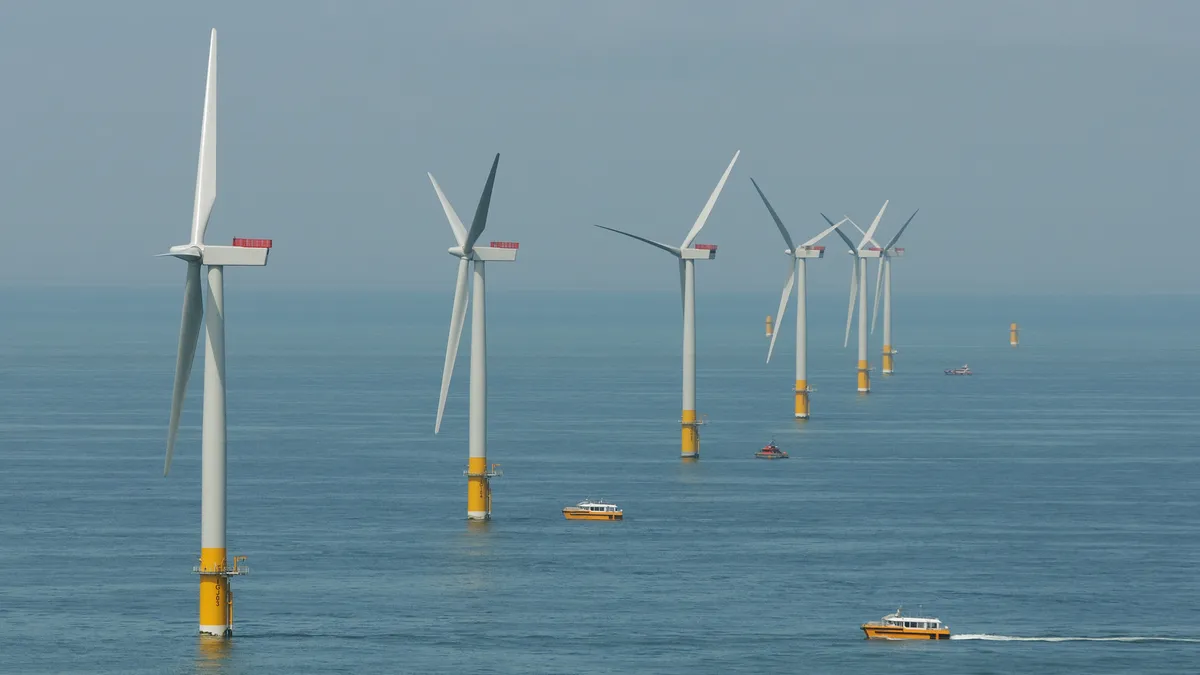Dive Brief:
-
ISO New England's proposal to keep its "minimum offer price rule" until 2025 will hurt the Northeast's efforts to build renewable energy facilities like offshore wind farms and should be rejected, lawmakers, the Massachusetts attorney general and renewable energy advocates and developers told the Federal Energy Regulatory Commission Thursday.
-
"The primary effect of the MOPR reform delay would be to impede market entry by offshore wind resources," Conservation Law Foundation, the Acadia Center and other groups said in a joint filing at FERC. "The ISO has presented zero evidence that such a change in the resource mix will reduce reliability, rather than improve it."
-
However, the plan is backed by power plant owners, power suppliers and ISO-NE's market monitor, and the New England States Committee on Electricity, representing the region's governors, doesn't oppose it, according to filings at FERC.
Dive Insight:
ISO-NE started a stakeholder process in May to consider options for eliminating its MOPR, which critics contend impedes state energy goals by preventing state-supported resources from winning capacity bids in the grid operator's annual capacity auctions.
At the time, ISO-NE supported eliminating the MOPR before the next auction set to be held in February. But in January, the grid operator decided to support a proposal to keep the MOPR for two additional years, with a 700-MW exemption for state-supported resources. In its March 31 proposal, ISO-NE said ending the MOPR immediately could lead to the sudden retirement of power plants, threatening grid reliability in the region.
More than 4,700 MW of nameplate offshore wind, or about 1,310 MW of qualified capacity, is slated to begin operating by 2028, the period that would be covered by auctions affected by ISO-NE's transition proposal, according to New England For Offshore Wind, an advocacy group. The grid operator's proposed 700-MW exemption for qualified capacity would keep some offshore projects from winning capacity bids, driving up ratepayer costs, the group told FERC.
Sens. Edward Markey, D-Mass., Elizabeth Warren, D-Mass., and Bernie Sanders, I-Vt., urged FERC to reject ISO-NE's proposal, which they said would hurt New England's decarbonization efforts and lead to higher electricity prices.
"At the very moment when New England should be fully embracing the transition to renewables and the related socioeconomic opportunities, this decision to undermine state actions and renewable energy deployment is a terrible and ill-timed mistake," they said in a letter to FERC.
Other parties urging FERC to order ISO-NE to immediately end its MOPR include the Massachusetts attorney general, a group of New England state lawmakers and the American Council on Renewable Energy.
Some renewable energy advocates are reluctantly supporting the proposed transition away from the MOPR.
Rejecting the proposal could lead to an extended stakeholder process, possibly delaying the upcoming capacity auction and other market reforms, Advanced Energy Economy, said in a filing at FERC.
"We believe that approval is the least disruptive path forward for the region given where the process leading to this filing has left us," the trade group said, noting ISO-NE's abrupt decision to delay ending the MOPR left stakeholders little time to review the plan.
NESCOE, which has sought to end the MOPR, isn't opposing the delay in ending it because ISO-NE's proposal provides "a clear, defined, and expedient path for reforming market mitigation rules with a fixed and near-term end-date," the organization told FERC.
Potomac Economics, ISO-NE's market monitor, supported the grid operator's transition plan, saying it would give ISO-NE time to make other needed market changes such as revising how it accredits capacity and accounts for growing financial risk for power plant owners.
"This will alleviate the adverse economic impacts and risks to reliability of implementing the MOPR changes immediately," the market monitor said.
Power plant owners and power marketers also support ISO-NE's plan, which was modeled on proposals from Vistra, Dynegy, Calpine and Nautilus Power.
"This graduated elimination of the MOPR will allow ISO-NE and [New England Power Pool] stakeholders the time to make the wholesale market design changes necessary to avoid the increased risks MOPR elimination creates, including implementation of a new capacity accreditation methodology and day-ahead reserve or call-option products in the day-ahead energy market," the New England Power Generators Association said in a filing at FERC.
The Electric Power Supply Association also backs ISO-NE's proposal, partly because it gives the grid operator time to put in place other market reforms, according to comments at FERC.
The trade group for competitive power suppliers noted it supports a New York Independent System Operator proposal to eliminate its MOPR because the New York plan includes related market reforms.














